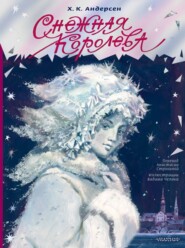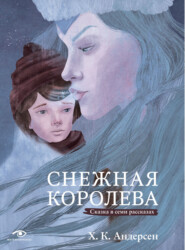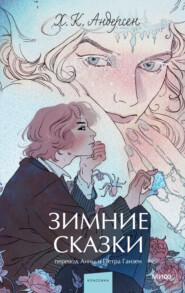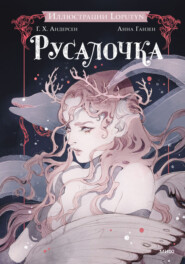По всем вопросам обращайтесь на: info@litportal.ru
(©) 2003-2024.
✖
Hans Andersen's Fairy Tales. First Series
Настройки чтения
Размер шрифта
Высота строк
Поля
Then the snow began to fall so heavily that the little boy could not see a hand's breadth before him, but still they drove on. He suddenly loosened the cord so that the large sledge might go on without him, but it was of no use; his little carriage held fast, and away they went like the wind. Then he called out loudly, but nobody heard him, while the snow beat upon him, and the sledge flew onward. Every now and then it gave a jump, as if they were going over hedges and ditches. The boy was frightened and tried to say a prayer, but he could remember nothing but the multiplication table.
The snowflakes became larger and larger, till they appeared like great white birds. All at once they sprang on one side, the great sledge stopped, and the person who had driven it rose up. The fur and the cap, which were made entirely of snow, fell off, and he saw a lady, tall and white; it was the Snow Queen.
"We have driven well," said she; "but why do you tremble so? Here, creep into my warm fur." Then she seated him beside her in the sledge, and as she wrapped the fur about him, he felt as if he were sinking into a snowdrift.
"Are you still cold?" she asked, as she kissed him on the forehead. The kiss was colder than ice; it went quite through to his heart, which was almost a lump of ice already. He felt as if he were going to die, but only for a moment – he soon seemed quite well and did not notice the cold all around him.
"My sledge! Don't forget my sledge," was his first thought, and then he looked and saw that it was bound fast to one of the white birds which flew behind him. The Snow Queen kissed little Kay again, and by this time he had forgotten little Gerda, his grandmother, and all at home.
"Now you must have no more kisses," she said, "or I should kiss you to death."
Kay looked at her. She was so beautiful, he could not imagine a more lovely face; she did not now seem to be made of ice as when he had seen her through his window and she had nodded to him.
In his eyes she was perfect, and he did not feel at all afraid. He told her he could do mental arithmetic as far as fractions, and that he knew the number of square miles and the number of inhabitants in the country. She smiled, and it occurred to him that she thought he did not yet know so very much.
He looked around the vast expanse as she flew higher and higher with him upon a black cloud, while the storm blew and howled as if it were singing songs of olden time. They flew over woods and lakes, over sea and land; below them roared the wild wind; wolves howled, and the snow crackled; over them flew the black, screaming crows, and above all shone the moon, clear and bright – and so Kay passed through the long, long winter's night, and by day he slept at the feet of the Snow Queen.
THIRD STORY
THE ENCHANTED FLOWER GARDEN
But how fared little Gerda in Kay's absence?
What had become of him no one knew, nor could any one give the slightest information, excepting the boys, who said that he had tied his sledge to another very large one, which had driven through the street and out at the town gate. No one knew where it went. Many tears were shed for him, and little Gerda wept bitterly for a long time. She said she knew he must be dead, that he was drowned in the river which flowed close by the school. The long winter days were very dreary. But at last spring came with warm sunshine.
"Kay is dead and gone," said little Gerda.
"I don't believe it," said the sunshine.
"He is dead and gone," she said to the sparrows.
"We don't believe it," they replied, and at last little Gerda began to doubt it herself.
"I will put on my new red shoes," she said one morning, "those that Kay has never seen, and then I will go down to the river and ask for him."
It was quite early when she kissed her old grandmother, who was still asleep; then she put on her red shoes and went, quite alone, out of the town gate, toward the river.
"Is it true that you have taken my little playmate away from me?" she said to the river. "I will give you my red shoes if you will give him back to me."
And it seemed as if the waves nodded to her in a strange manner. Then she took off her red shoes, which she liked better than anything else, and threw them both into the river, but they fell near the bank, and the little waves carried them back to land just as if the river would not take from her what she loved best, because it could not give her back little Kay.
But she thought the shoes had not been thrown out far enough. Then she crept into a boat that lay among the reeds, and threw the shoes again from the farther end of the boat into the water; but it was not fastened, and her movement sent it gliding away from the land. When she saw this she hastened to reach the end of the boat, but before she could do so it was more than a yard from the bank and drifting away faster than ever.
Little Gerda was very much frightened. She began to cry, but no one heard her except the sparrows, and they could not carry her to land, but they flew along by the shore and sang as if to comfort her: "Here we are! Here we are!"
The boat floated with the stream, and little Gerda sat quite still with only her stockings on her feet; the red shoes floated after her, but she could not reach them because the boat kept so much in advance.
The banks on either side of the river were very pretty. There were beautiful flowers, old trees, sloping fields in which cows and sheep were grazing, but not a human being to be seen.
"Perhaps the river will carry me to little Kay," thought Gerda, and then she became more cheerful, and raised her head and looked at the beautiful green banks; and so the boat sailed on for hours. At length she came to a large cherry orchard, in which stood a small house with strange red and blue windows. It had also a thatched roof, and outside were two wooden soldiers that presented arms to her as she sailed past. Gerda called out to them, for she thought they were alive; but of course they did not answer, and as the boat drifted nearer to the shore she saw what they really were.
Then Gerda called still louder, and there came a very old woman out of the house, leaning on a crutch. She wore a large hat to shade her from the sun, and on it were painted all sorts of pretty flowers.
"You poor little child," said the old woman, "how did you manage to come this long, long distance into the wide world on such a rapid, rolling stream?" And then the old woman walked into the water, seized the boat with her crutch, drew it to land, and lifted little Gerda out. And Gerda was glad to feel herself again on dry ground, although she was rather afraid of the strange old woman.
"Come and tell me who you are," said she, "and how you came here."
Then Gerda told her everything, while the old woman shook her head and said, "Hem-hem"; and when Gerda had finished she asked the old woman if she had not seen little Kay. She told her he had not passed that way, but he very likely would come. She told Gerda not to be sorrowful, but to taste the cherries and look at the flowers; they were better than any picture book, for each of them could tell a story. Then she took Gerda by the hand, and led her into the little house, and closed the door. The windows were very high, and as the panes were red, blue, and yellow, the daylight shone through them in all sorts of singular colors. On the table stood some beautiful cherries, and Gerda had permission to eat as many as she would. While she was eating them the old woman combed out her long flaxen ringlets with a golden comb, and the glossy curls hung down on each side of the little round, pleasant face, which looked fresh and blooming as a rose.
"I have long been wishing for a dear little maiden like you," said the old woman, "and now you must stay with me and see how happily we shall live together." And while she went on combing little Gerda's hair the child thought less and less about her adopted brother Kay, for the old woman was an enchantress, although she was not a wicked witch; she conjured only a little for her own amusement, and, now, because she wanted to keep Gerda. Therefore she went into the garden and stretched out her crutch toward all the rose trees, beautiful though they were, and they immediately sank into the dark earth, so that no one could tell where they had once stood. The old woman was afraid that if little Gerda saw roses, she would think of those at home and then remember little Kay and run away.
Then she took Gerda into the flower garden. How fragrant and beautiful it was! Every flower that could be thought of, for every season of the year, was here in full bloom; no picture book could have more beautiful colors. Gerda jumped for joy, and played till the sun went down behind the tall cherry trees; then she slept in an elegant bed, with red silk pillows embroidered with colored violets, and she dreamed as pleasantly as a queen on her wedding day.
The next day, and for many days after, Gerda played with the flowers in the warm sunshine. She knew every flower, and yet, although there were so many of them, it seemed as if one were missing, but what it was she could not tell. One day, however, as she sat looking at the old woman's hat with the painted flowers on it, she saw that the prettiest of them all was a rose. The old woman had forgotten to take it from her hat when she made all the roses sink into the earth. But it is difficult to keep the thoughts together in everything, and one little mistake upsets all our arrangements.
"What! are there no roses here?" cried Gerda, and she ran out into the garden and examined all the beds, and searched and searched. There was not one to be found. Then she sat down and wept, and her tears fell just on the place where one of the rose trees had sunk down. The warm tears moistened the earth, and the rose tree sprouted up at once, as blooming as when it had sunk; and Gerda embraced it, and kissed the roses, and thought of the beautiful roses at home, and, with them, of little Kay.
"Oh, how I have been detained!" said the little maiden. "I wanted to seek for little Kay. Do you know where he is?" she asked the roses; "do you think he is dead?"
And the roses answered: "No, he is not dead. We have been in the ground, where all the dead lie, but Kay is not there."
"Thank you," said little Gerda, and then she went to the other flowers and looked into their little cups and asked, "Do you know where little Kay is?" But each flower as it stood in the sunshine dreamed only of its own little fairy tale or history. Not one knew anything of Kay. Gerda heard many stories from the flowers, as she asked them one after another about him.
And then she ran to the other end of the garden. The door was fastened, but she pressed against the rusty latch, and it gave way. The door sprang open, and little Gerda ran out with bare feet into the wide world. She looked back three times, but no one seemed to be following her. At last she could run no longer, so she sat down to rest on a great stone, and when she looked around she saw that the summer was over and autumn very far advanced. She had known nothing of this in the beautiful garden where the sun shone and the flowers grew all the year round.
"Oh, how I have wasted my time!" said little Gerda. "It is autumn; I must not rest any longer," and she rose to go on. But her little feet were wounded and sore, and everything around her looked cold and bleak. The long willow leaves were quite yellow, the dewdrops fell like water, leaf after leaf dropped from the trees; the sloe thorn alone still bore fruit, but the sloes were sour and set the teeth on edge. Oh, how dark and weary the whole world appeared!
FOURTH STORY
THE PRINCE AND PRINCESS
Gerda was obliged to rest again, and just opposite the place where she sat she saw a great crow come hopping toward her across the snow. He stood looking at her for some time, and then he wagged his head and said, "Caw, caw, good day, good day." He pronounced the words as plainly as he could, because he meant to be kind to the little girl, and then he asked her where she was going all alone in the wide world.
The word "alone" Gerda understood very well and felt how much it expressed. So she told the crow the whole story of her life and adventures and asked him if he had seen little Kay.
The crow nodded his head very gravely and said, "Perhaps I have – it may be."
"No! Do you really think you have?" cried little Gerda, and she kissed the crow and hugged him almost to death, with joy.
"Gently, gently," said the crow. "I believe I know. I think it may be little Kay; but he has certainly forgotten you by this time, for the princess."
"Does he live with a princess?" asked Gerda.
"Yes, listen," replied the crow; "but it is so difficult to speak your language. If you understand the crows' language, then I can explain it better. Do you?"
"No, I have never learned it," said Gerda, "but my grandmother understands it, and used to speak it to me. I wish I had learned it."
"It does not matter," answered the crow. "I will explain as well as I can, although it will be very badly done"; and he told her what he had heard.
The snowflakes became larger and larger, till they appeared like great white birds. All at once they sprang on one side, the great sledge stopped, and the person who had driven it rose up. The fur and the cap, which were made entirely of snow, fell off, and he saw a lady, tall and white; it was the Snow Queen.
"We have driven well," said she; "but why do you tremble so? Here, creep into my warm fur." Then she seated him beside her in the sledge, and as she wrapped the fur about him, he felt as if he were sinking into a snowdrift.
"Are you still cold?" she asked, as she kissed him on the forehead. The kiss was colder than ice; it went quite through to his heart, which was almost a lump of ice already. He felt as if he were going to die, but only for a moment – he soon seemed quite well and did not notice the cold all around him.
"My sledge! Don't forget my sledge," was his first thought, and then he looked and saw that it was bound fast to one of the white birds which flew behind him. The Snow Queen kissed little Kay again, and by this time he had forgotten little Gerda, his grandmother, and all at home.
"Now you must have no more kisses," she said, "or I should kiss you to death."
Kay looked at her. She was so beautiful, he could not imagine a more lovely face; she did not now seem to be made of ice as when he had seen her through his window and she had nodded to him.
In his eyes she was perfect, and he did not feel at all afraid. He told her he could do mental arithmetic as far as fractions, and that he knew the number of square miles and the number of inhabitants in the country. She smiled, and it occurred to him that she thought he did not yet know so very much.
He looked around the vast expanse as she flew higher and higher with him upon a black cloud, while the storm blew and howled as if it were singing songs of olden time. They flew over woods and lakes, over sea and land; below them roared the wild wind; wolves howled, and the snow crackled; over them flew the black, screaming crows, and above all shone the moon, clear and bright – and so Kay passed through the long, long winter's night, and by day he slept at the feet of the Snow Queen.
THIRD STORY
THE ENCHANTED FLOWER GARDEN
But how fared little Gerda in Kay's absence?
What had become of him no one knew, nor could any one give the slightest information, excepting the boys, who said that he had tied his sledge to another very large one, which had driven through the street and out at the town gate. No one knew where it went. Many tears were shed for him, and little Gerda wept bitterly for a long time. She said she knew he must be dead, that he was drowned in the river which flowed close by the school. The long winter days were very dreary. But at last spring came with warm sunshine.
"Kay is dead and gone," said little Gerda.
"I don't believe it," said the sunshine.
"He is dead and gone," she said to the sparrows.
"We don't believe it," they replied, and at last little Gerda began to doubt it herself.
"I will put on my new red shoes," she said one morning, "those that Kay has never seen, and then I will go down to the river and ask for him."
It was quite early when she kissed her old grandmother, who was still asleep; then she put on her red shoes and went, quite alone, out of the town gate, toward the river.
"Is it true that you have taken my little playmate away from me?" she said to the river. "I will give you my red shoes if you will give him back to me."
And it seemed as if the waves nodded to her in a strange manner. Then she took off her red shoes, which she liked better than anything else, and threw them both into the river, but they fell near the bank, and the little waves carried them back to land just as if the river would not take from her what she loved best, because it could not give her back little Kay.
But she thought the shoes had not been thrown out far enough. Then she crept into a boat that lay among the reeds, and threw the shoes again from the farther end of the boat into the water; but it was not fastened, and her movement sent it gliding away from the land. When she saw this she hastened to reach the end of the boat, but before she could do so it was more than a yard from the bank and drifting away faster than ever.
Little Gerda was very much frightened. She began to cry, but no one heard her except the sparrows, and they could not carry her to land, but they flew along by the shore and sang as if to comfort her: "Here we are! Here we are!"
The boat floated with the stream, and little Gerda sat quite still with only her stockings on her feet; the red shoes floated after her, but she could not reach them because the boat kept so much in advance.
The banks on either side of the river were very pretty. There were beautiful flowers, old trees, sloping fields in which cows and sheep were grazing, but not a human being to be seen.
"Perhaps the river will carry me to little Kay," thought Gerda, and then she became more cheerful, and raised her head and looked at the beautiful green banks; and so the boat sailed on for hours. At length she came to a large cherry orchard, in which stood a small house with strange red and blue windows. It had also a thatched roof, and outside were two wooden soldiers that presented arms to her as she sailed past. Gerda called out to them, for she thought they were alive; but of course they did not answer, and as the boat drifted nearer to the shore she saw what they really were.
Then Gerda called still louder, and there came a very old woman out of the house, leaning on a crutch. She wore a large hat to shade her from the sun, and on it were painted all sorts of pretty flowers.
"You poor little child," said the old woman, "how did you manage to come this long, long distance into the wide world on such a rapid, rolling stream?" And then the old woman walked into the water, seized the boat with her crutch, drew it to land, and lifted little Gerda out. And Gerda was glad to feel herself again on dry ground, although she was rather afraid of the strange old woman.
"Come and tell me who you are," said she, "and how you came here."
Then Gerda told her everything, while the old woman shook her head and said, "Hem-hem"; and when Gerda had finished she asked the old woman if she had not seen little Kay. She told her he had not passed that way, but he very likely would come. She told Gerda not to be sorrowful, but to taste the cherries and look at the flowers; they were better than any picture book, for each of them could tell a story. Then she took Gerda by the hand, and led her into the little house, and closed the door. The windows were very high, and as the panes were red, blue, and yellow, the daylight shone through them in all sorts of singular colors. On the table stood some beautiful cherries, and Gerda had permission to eat as many as she would. While she was eating them the old woman combed out her long flaxen ringlets with a golden comb, and the glossy curls hung down on each side of the little round, pleasant face, which looked fresh and blooming as a rose.
"I have long been wishing for a dear little maiden like you," said the old woman, "and now you must stay with me and see how happily we shall live together." And while she went on combing little Gerda's hair the child thought less and less about her adopted brother Kay, for the old woman was an enchantress, although she was not a wicked witch; she conjured only a little for her own amusement, and, now, because she wanted to keep Gerda. Therefore she went into the garden and stretched out her crutch toward all the rose trees, beautiful though they were, and they immediately sank into the dark earth, so that no one could tell where they had once stood. The old woman was afraid that if little Gerda saw roses, she would think of those at home and then remember little Kay and run away.
Then she took Gerda into the flower garden. How fragrant and beautiful it was! Every flower that could be thought of, for every season of the year, was here in full bloom; no picture book could have more beautiful colors. Gerda jumped for joy, and played till the sun went down behind the tall cherry trees; then she slept in an elegant bed, with red silk pillows embroidered with colored violets, and she dreamed as pleasantly as a queen on her wedding day.
The next day, and for many days after, Gerda played with the flowers in the warm sunshine. She knew every flower, and yet, although there were so many of them, it seemed as if one were missing, but what it was she could not tell. One day, however, as she sat looking at the old woman's hat with the painted flowers on it, she saw that the prettiest of them all was a rose. The old woman had forgotten to take it from her hat when she made all the roses sink into the earth. But it is difficult to keep the thoughts together in everything, and one little mistake upsets all our arrangements.
"What! are there no roses here?" cried Gerda, and she ran out into the garden and examined all the beds, and searched and searched. There was not one to be found. Then she sat down and wept, and her tears fell just on the place where one of the rose trees had sunk down. The warm tears moistened the earth, and the rose tree sprouted up at once, as blooming as when it had sunk; and Gerda embraced it, and kissed the roses, and thought of the beautiful roses at home, and, with them, of little Kay.
"Oh, how I have been detained!" said the little maiden. "I wanted to seek for little Kay. Do you know where he is?" she asked the roses; "do you think he is dead?"
And the roses answered: "No, he is not dead. We have been in the ground, where all the dead lie, but Kay is not there."
"Thank you," said little Gerda, and then she went to the other flowers and looked into their little cups and asked, "Do you know where little Kay is?" But each flower as it stood in the sunshine dreamed only of its own little fairy tale or history. Not one knew anything of Kay. Gerda heard many stories from the flowers, as she asked them one after another about him.
And then she ran to the other end of the garden. The door was fastened, but she pressed against the rusty latch, and it gave way. The door sprang open, and little Gerda ran out with bare feet into the wide world. She looked back three times, but no one seemed to be following her. At last she could run no longer, so she sat down to rest on a great stone, and when she looked around she saw that the summer was over and autumn very far advanced. She had known nothing of this in the beautiful garden where the sun shone and the flowers grew all the year round.
"Oh, how I have wasted my time!" said little Gerda. "It is autumn; I must not rest any longer," and she rose to go on. But her little feet were wounded and sore, and everything around her looked cold and bleak. The long willow leaves were quite yellow, the dewdrops fell like water, leaf after leaf dropped from the trees; the sloe thorn alone still bore fruit, but the sloes were sour and set the teeth on edge. Oh, how dark and weary the whole world appeared!
FOURTH STORY
THE PRINCE AND PRINCESS
Gerda was obliged to rest again, and just opposite the place where she sat she saw a great crow come hopping toward her across the snow. He stood looking at her for some time, and then he wagged his head and said, "Caw, caw, good day, good day." He pronounced the words as plainly as he could, because he meant to be kind to the little girl, and then he asked her where she was going all alone in the wide world.
The word "alone" Gerda understood very well and felt how much it expressed. So she told the crow the whole story of her life and adventures and asked him if he had seen little Kay.
The crow nodded his head very gravely and said, "Perhaps I have – it may be."
"No! Do you really think you have?" cried little Gerda, and she kissed the crow and hugged him almost to death, with joy.
"Gently, gently," said the crow. "I believe I know. I think it may be little Kay; but he has certainly forgotten you by this time, for the princess."
"Does he live with a princess?" asked Gerda.
"Yes, listen," replied the crow; "but it is so difficult to speak your language. If you understand the crows' language, then I can explain it better. Do you?"
"No, I have never learned it," said Gerda, "but my grandmother understands it, and used to speak it to me. I wish I had learned it."
"It does not matter," answered the crow. "I will explain as well as I can, although it will be very badly done"; and he told her what he had heard.

















